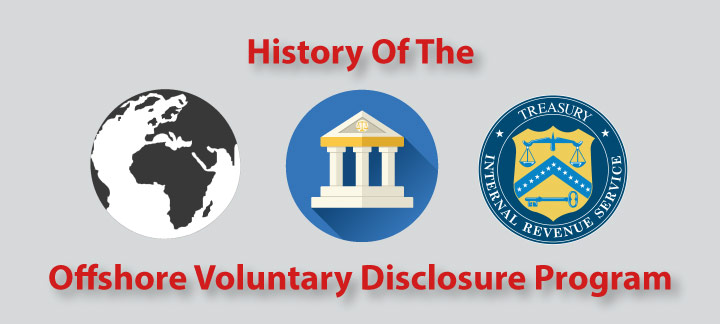History of the Offshore Voluntary Disclosure Program
The IRS Criminal Investigation division has a longstanding practice of considering a taxpayer’s timely, accurate, and complete voluntary disclosure in determining whether or not to pursue criminal prosecution against the taxpayer. Beginning in 2009, the IRS established a series of programs specifically designed to allow tax payers to voluntarily disclose the existence of foreign financial accounts in return for some protection against prosecution for criminal tax evasion. The 2009 program was known as voluntary disclosure agreement regarding their foreign financial accounts and become current on all outstanding income tax obligations. As the IRS and the Department of Justice have increased efforts to identify taxpayers will undisclosed foreign accounts and collect unpaid taxes, many taxpayers who had previously gone undetected have been subject to increased scrutiny. At the same time, the Foreign Account Tax Compliance Act (FATCA) is expected to go into effect soon as well. FATCA, which became law in March 2010, also targets tax non-compliance by U.S. taxpayers with foreign accounts. Under FATCA, both taxpayers with offshore financial accounts and assets, as well as the financial institutions housing foreign financial accounts by U.S. taxpayers, have reporting obligations to the IRS (1). OVDP allows taxpayers who are potentially suitable for criminal prosecution to possibly avoid such prosecution by participation in the program.
Which Taxpayers Should Consider Participation in OVDP?
Taxpayers who have undisclosed foreign financial assets and accounts should consider participating in the Offshore Voluntary Disclosure Program. Voluntary disclosure through OVDP enables certain taxpayers to become compliant, avoid substantial civil penalties, and generally eliminate the risk of criminal prosecution for all issues relating to tax noncompliance and failing to file FBARs (2). It is important to note that taxpayers who simply follow the Streamlined Filing Compliance Procedures, rather than making a full disclosure through OVDP, are not completely protected from criminal prosecution (3). Another advantage of voluntary disclosure is that is provides the taxpayer the option of calculating the total cost of resolving offshore taxation issues with reasonable certainty.
The downside to failing to make a voluntary disclosure is that the taxpayer is placed at a greater risk of detection by the IRS, incurring fraud penalties and foreign information return penalties, and potential criminal prosecution by the IRS and the Department of Justice.
How a Tax Attorney Can Help with Offshore Voluntary Disclosure Program
If you have offshore foreign accounts or assets, you may be eligible to participate in OVDP. In order to evaluate whether OVDP is the right decision for your international tax situation, you should consider consulting a knowledgeable tax attorney.
The Tax Lawyer - William D Hartsock Tax Attorney Inc. has been successfully helping clients with tax issues related to their foreign assets since the early 1980s. Mr. Hartsock offers free consultations with the full benefit and protections of attorney client privilege to help people clearly understand their situation and options based on the circumstances of their case. To schedule your free consultation simply fill out the contact form found on this page, or call (858) 481-4844.
Tax Law References:
- Internal Revenue Service, http://www.irs.gov/Businesses/Corporations/Foreign-Account-Tax-Compliance-Act-FATCA.
- Offshore Voluntary Disclosure Program Frequently Asked Questions and Answers, FAQ 4, http://www.irs.gov/Individuals/International-Taxpayers/Offshore-Voluntary-Disclosure-Program-Frequently-Asked-Questions-and-Answers-2012-Revised.
- Offshore Voluntary Disclosure Program Frequently Asked Questions and Answers, FAQ 4, http://www.irs.gov/Individuals/International-Taxpayers/Offshore-Voluntary-Disclosure-Program-Frequently-Asked-Questions-and-Answers-2012-Revised.



Comments (0)